- Home
- Piers Anthony
Cluster Page 20
Cluster Read online
Page 20
He emerged into another hall, similar to the first There were side passages branching off. He should have thought to study a map of the ship; he was in danger of getting lost.
Well, he didn't have all day. If he went straight ahead he was bound to get somewhere, as the size of the ship was finite. He passed through another sealed portal—and suddenly faced the residential portion of the ship.
It was breathtaking—though in this host he did not breathe, exactly. The whole cargo section had been left open, a monstrous cavelike chamber, with the housing of the colonists on the outer wall. The spin of the ship held them there at approximately Earth gravity; this was a lot simpler and cheaper and more reliable than artificial gravity, and simplicity was the keynote of a lifeship, for all its sophistication. The less complicated it was, the less could go wrong with it; that was a universal principle.
By the same token, the necessary recycling of organic substances was done by natural means. Assorted plants grew, in some sections amounting to a veritable jungle. He recognized berry bushes and fruit trees. This was very like that ancient Garden of Eden the Shaman had told him of.
Had man come to Earth originally in just such a vessel, and the legend of Eden was all that remained after regression had wiped out the memory? If so, where had man come from? Could there be genuine human beings elsewhere in the galaxy, never connected to Earth or Sphere Sol? He would have to meditate on that sometime.
He moved into the nearest field, skirting a small lake where fish swam. He rounded a tangle of hedge—and encountered his first sentient.
Flint wheeled back, appalled. The creature was grotesque. It stood on a split fundament, with bony joints at intervals. Two bent sticklike appendages projected from the sides, terminating in splays of miniature digits. The thing was all angular and rigid, yet with an irregular covering of flesh that made portions of it bulge outward like spilling candle wax, half-congealed. At the top was a head perforated by several holes, half-buried under a tumbling mane of hairs.
Flint's system revolted. He felt sick, which was a problem, because this body had no way to vomit. He had never liked illness or grotesqueries, and never before had he contemplated anything so inherently disgusting. For this was no primitive monster; it was conscious and sapient.
Then he realized: This was a human being. A naked female.
He forced himself to reorient, as he had in Spica when disorganized by the enormity of the triangular sexuality there. Gradually his human essence assumed command. By the definition of his kind, this was a nubile young woman, lithe and healthy and sexually desirable, like his fiancée Honeybloom. Monster indeed!
How thoroughly he had merged with his Polarian host! This was a plain warning: his Kirlian aura was fading dangerously, reducing his human identity. It was supposed to diminish at the rate of one intensity-norm per day, but evidently this was variable. He would have to wrap up this mission and return to his own body—he quelled a surge of distaste at the notion—for a prolonged recuperation of aura. Maybe he was fading faster as a result of the fatigue of repeated transfer missions.
But at the moment he had another mission: to explain things to these lifeship primitives, and to give the secret of transfer to the Polarians.
The girl, meanwhile, seemed as startled as he was. In a moment she would bolt in terror. "Do not flee," he said quickly. "I will not hurt you."
She screamed piercingly and ran, her torso and limbs flexing in a manner that would have intrigued Flint had he been in a human body. He could not afford to have her depart in confusion, so he wheeled after her, overtaking her easily. He reached his trunk around her, to stop her flight—and it passed through her without resistance. He had forgotten he was only an image.
So he paced her, keeping up easily because of his superior mode of travel. "Listen to me! I represent Polaris Sphere—" And stopped. Idiot that he was, he had been speaking in Polarian. No way for the girl to understand him.
In fact, he had gone at this all wrong. He should have had the technician arrange for a human image rather than this Polarian one; surely the equipment was capable of such a translation. As a strange human, he could have commanded the girl's attention, and spoken to her in her Own language. Obvious—in retrospect.
Now the girl's screams had alerted her tribe. Naked men appeared, carrying homemade spears: crude weapons, preflint, he noted professionally. What a boon flintstone was to ancient man, with its supreme hardness and chip-ability. Yet here, amidst the advanced metal of a functioning spacecraft, they had lost even good stone. Probably there was no flint to be had. Without hesitation they threw these clumsy shafts at Flint—without effect, of course.
When they saw that, they all fled. Flint rolled to a halt. He had bungled the mission brilliantly. "Cancel the projection, before I do any more harm," he said.
And he was back in the booth.
"I'm sorry," he said. "I ruined it. A complete disaster. As a Paleolithic man myself, I should have known better."
"Do not be unwheeled," Dligt said. "You may have been too close to the problem, lacking the vantage of dissimilarity. We have failed many times in initial contacts; your involvement was an experiment in linearity that has taught us much."
"You're right; the straight-line approach can be completely wrong. I see that now. But I have spoiled it for your circular approach, too. I don't know how to make amends."
"Not at all. Being now satisfied that the linear system is not applicable to the present case, we shall return to circularity. We shall project a still figure of a Polarian, along with a tangible offering of trinkets to delight the primitive mind. In time they will discover that there is no harm in the projection, and will seek more trinkets, which we shall provide. This will lead inevitably to communication, because they will desire it. It will take time, and many circuits, but the end result is assured."
"Circularity..." Flint said. "Slow but sure. Yes, I understand now. And I suspect you understand the primitive mind better than I do."
"I do approach it from a more distant perspective," the Ringer agreed. "Also, civilization has an insidious effect, if you are not accustomed to it. It changes you subtly, until you are a different person—without knowing it. You are no longer Paleolithic."
"You are perceptive," Flint said.
"Merely trained in the field."
Flint thought of Tsopi, who had not tried to oppose his direct-line thinking. Had he appeared to her as the life-ship female had appeared to him? All angular and horrible? Then she, too, had overcome a formidable revulsion—only to run afoul of the human mode of thinking, as disastrous to social interaction as to initial contacts. "I am unused to the concept of circularity, but perceive it has merit. You have been most understanding. May I prevail on you to put a linear query in a separate matter?"
The official seemed surprised. "Linearity is your nature, yet you have done much to overcome it. I shall try to respond in that fashion."
"I appreciate it, Delight. If one of the parties declines to make a debt-settlement when the opportunity offers, what happens?"
"That is the subject of half our literature!" Dligt said. "The results are highly variable. Many debts cannot be settled."
"One that can be settled. If a male declined solely because he preferred to perform an unrelated mission—one that could wait a little longer, but—"
"To turn down a debt-settlement capriciously? Nothing is more important than debt. The entire culture suffers if any facet of individual prerogative is infringed. Are you familiar with the legend of Roller and the Bearing?"
Flint stifled a snort of laughter (not hard to stifle, since the Polarian ball did not snort well), realizing that this was serious. "I regret, no."
"Roller was a primitive yet attractive male who inadvertently incurred debt-exchange with an immature female, a bearing. Her age prevented immediate abatement. When she was of age she sought him out—but Roller did not recognize her, and so quite properly declined to mate. Maturation changes females, y
ou understand—"
"I understand," Flint said, remembering the phenomenal change in Honeybloom, once a thin, shy child.
"Rather than off-balance the debt by informing him of his error, the Bearing sought her own repose."
Flint's memory jogged. Tsopi had used that phrase. "Does that mean what I begin to suspect it means?"
"She is now in the sky as one of our fainter stars. It is a beloved, sad story."
Flint's worst fear had just been realized. "She... died? Rather than tell him?"
"In linear terms, yes. Forgive me if I have become circular. I realize your query was theoretical, but it is a delicate subject, even so. The Polarian mind can conceive of virtually no circumstances that would justify such crude debt-abatement."
Dligt evidently had a pretty fair notion of Flint's problem, but was being most circumspect—as was the Polarian nature. "Such crudity is possible to a primitive alien mind, however," Flint said grimly, feeling a terrible rawness inside. "Please, I have made another uncircular mistake. Will you mattermit me directly to the palace on Polaris Prime?"
"Certainly." And without delay the official set the controls, and Flint rolled through the mattermitter into the palace a hundred and fifty light-years away.
The Big Wheel was right there. "So the emissary completes a circuit," he commented.
Suddenly Flint thought: What did Roller do, when he learned of the Bearing's fate? "In your constellations, where is the figure of Roller?"
"Odd you should inquire about that particular figure. Or were you already aware that it is otherwise known as Etamin, your Dragon star?"
"I am aware now," Flint said. And he knew what he had to do. Whether he was now more Solarian or more Polarian he could not be sure, but the Polarian way was what he had to seek. Every mistake he had made had been the result of linear thinking.
"I shall summon my technicians," the Big Wheel said.
"I regret I cannot meet with them," Flint said. "I regret that your Sphere must suffer, but at the moment its welfare conflicts with that of an individual. If you will do me the kindness of informing me of the place of Topsy's demise, I will join her there." As Roller had joined the Bearing in the sky.
The Big Wheel paused. "We do not seek to impose our conventions on the natives of other Spheres. We did not understand you properly, and now we make amends by facilitating your mission linearly."
"Please spare me the embarrassment of attempting to explain," Flint said. "It would not be circular."
"We seem to have crossed each other's boundaries."
"Yes."
"In cases like this, individuals have been known to visit the Temple of Tarot."
"Circularity." And Flint rolled rapidly out of the Palace.
Back on Earth, he knew, they would never understand. Perhaps there would be Spherical repercussions because of his demise. But all that had become secondary. He had to settle with Tsopi before he could undertake anything else. Now he understood Polarian nature, and had phased through far enough to be dominated by it—and it was not just a matter of fading Kirlian aura. His treatment of Tsopi had been as wrong as failing to avoid the thrust of a spear. The shock of seeing himself as other creatures saw him, there in the lifeship, had made a great deal clear, too late. Had he only paid proper attention earlier....
He crossed the Temple portal and dropped inside. The Hierophant met him as he coasted up. "The Hermit returns."
"The Knight of Gas," Flint corrected him. Actually he had reproduced, making him the King of Gas, but that had been in a Spican host and probably didn't count. "I have come to join the Page of Solid. I must be one with the Small Bear." And what was a small bear, except a bearing?
"I am constrained to inquire whether you realize what this means, since you are not of our culture."
"It means the Three of Gas—and the Dancing Skeleton. Sorrow and Death, as the cards foretold. I did not appreciate their relevance before, but—"
"Neither do you appreciate them now," the Hierophant said. "You cannot substitute the Page of Earth for the Queen of Liquid and retain the relevance of the reading."
"At the moment, they are one," Flint said. "I balked on an abatement of debt, and I must repair that error in whatever way I can. Unite me with Topsy."
"Spoken like a true Polarian," the Hierophant remarked.
"Mock me if you will, for I deserve it. But deliver me to her."
"I would not mock so noble a gesture. It is the Polarian way, and you have shown creditable comprehension and decision. Stand in the animation chamber."
So it comes, Flint thought. Oddly, he was not afraid. On Luna, given the chance to die in his own fashion, he had declined, choosing instead to endure his problematical life. Now, rather than pursue a mission suddenly simplified, he chose the great transformation of death. It was not sensible, linearly, but it was right. He rolled across to the plate.
And as the light came, there was Tsopi, so real it seemed he could touch her, more beautiful than any creature he had ever seen before. "I come to expiate the debt between us," he said. "And—I love you, Small Bear."
For a moment she stood there, beautifully balanced on her wheel, like the tantalizing image she was. In that pause he realized that he had spoken only part of the truth when he said he loved her. He loved the other Small Bear too: the mode of Sphere Polaris.
Then she spoke, startling him—until he remembered the Polarian finesse with projections. Naturally they could animate her voice too. "And I love you, Alien Stone," she said, translating his name as he had hers. "It is like rising from the dead, finding you thus."
That hurt. What sadist was orchestrating this dialogue of his humiliation? "Wherever you may be, there I join you."
"I am in the Great Circle." Around them formed the huge bright sphere of the Polarian heaven, the Ultimate Circularity in which all of Sphere Sol was merely a faint constellation. There was the sound of perfect music and the taste of rapturous interaction and the sensation of harmony.
Flint reached toward her with his trunk, and she reached toward him with her tail—but he hesitated, not wishing to shatter the illusion by verifying her insubstantiality. Then she closed the gap—and there was physical contact.
Astonished, he drew her close. "You're alive!"
"Now I am," she said. "The Big Wheel bade me wait, so that he could remedy the matter."
So His Rondure had detoured Flint to an educational mission while he got the facts from Tsopi. "The Wheel is a meddling genius!" Flint exclaimed angrily. "He's downright linear in his fashion."
"That is how he retains his position," she agreed.
"Well, I meant everything I said, even if you are alive. I don't care how many Polarians laugh their balls off at my folly! I came to—"
"No one laughs," she demurred. "What you have done is beautiful, more circular than any native could have managed. You have reenacted the legend of your star."
He drew apart. "It is time," he said.
"Yes."
They circled each other, as before. Flint didn't care if the whole of Sphere Polaris was watching; he was going to abate the debt in style.
Tsopi laid down her provocative taste, and Flint augmented it with his own. The two trails fed on each other, building up the mood layer by layer as the two wheels spiraled inward toward the center.
At last they met. Flint's trunk and Tsopi's tail twined together, and their two balls touched each other in an electrifying spinning kiss.
Flint found that his body needed no instruction. As with Solarians and all other species both sapient and animal, nature sufficed. He knew it could not be worse than poking a stiffened stick into the body of the loved one.
Yet the steps of it astonished the human fragment of his mind. For at the height of his passion, Flint lay down and released his wheel. He had not realized that this was possible; he had supposed it was an inseparable part of his anatomy. Now it rolled slowly across the floor away from him, leaving him lame. Without that wheel, motion was vir
tually impossible; only in an extraordinary circumstance would any Polarian part with it.
The act of reproduction was one such occasion. Tsopi lay down opposite him and moved close—and Flint took the exposed portion of her wheel into his vacant wheel-chamber. The sensations were intensified excruciatingly, for they were direct; her secretions mixed with his without being diluted by an intervening surface. Trunk and tail reached around to twine together, drawing the connection tight.
Now the real action began. The rim of Flint's torso met the rim of Tsopi's, sealing all the way around their mutual sphere, so that none of it was exposed to the air. And the two of them spun it—rapidly. More rapidly than possible in any individual situation, for the wheel-controlling mechanisms of both parties were operating in tandem. Each had specialized adhesive muscles that touched the embedded surface of the wheel, moving it precisely and releasing it to other muscles. This was more than enough for ordinary locomotion—but now it was doubled.
The wheel spun so fast that it grew warm, then hot. Both Flint and Tsopi secreted extra fluid to bathe that sphere in its sealed chamber and alleviate friction, but still the heat increased. It was like traveling through a boiling lake at super-Polarian velocity. Flint knew, now, that that heat was penetrating the globe, making it pervious to the special juices. The elixir was reaching inward, deeper, changing the cellular structure of the mass, activating unique enzymes.
At last something within the wheel reacted. There was an electrochemical shift, as of a fire flaring up. It was the climax, that first stirring of buried animation. There was an instant of almost unbearable rapture as the shock went through the mass, then exhaustion.
Flint and Tsopi fell apart. The wheel rolled free of both of them, steaming. And while they struggled to regain their strength—complicated by the absence of their wheels, through which they normally ate, respirated, and eliminated—the loose mass began to shake and flex as though something inside were trying to get out. But it did not break open like a hatching egg; it elongated and unfolded, stage by stage, until it emerged complete, sculptured by the hand of nature: a young Polarian.

 Serial
Serial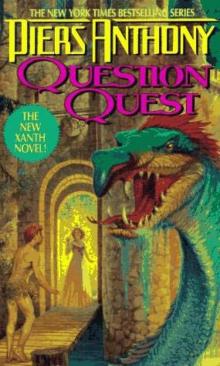 Question Quest
Question Quest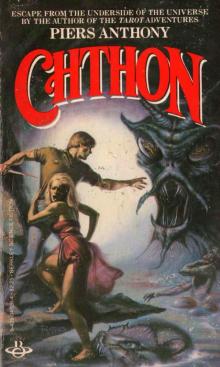 Chthon
Chthon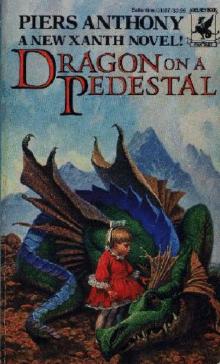 Dragon on a Pedestal
Dragon on a Pedestal E. S. P. Worm
E. S. P. Worm Hope of Earth
Hope of Earth The Series Boxed Set
The Series Boxed Set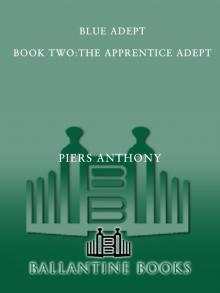 Blue Adept
Blue Adept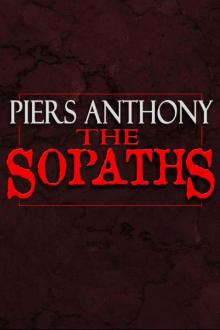 The Sopaths
The Sopaths Beetle Juice
Beetle Juice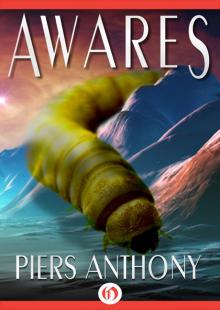 Awares
Awares Golem in the Gears
Golem in the Gears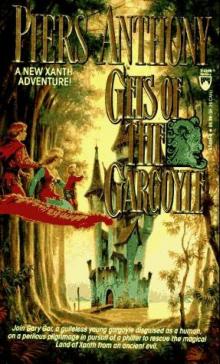 Geis of the Gargoyle
Geis of the Gargoyle Bamboo Bloodbath and Ninja's Revenge
Bamboo Bloodbath and Ninja's Revenge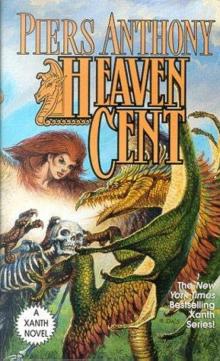 Heaven Cent
Heaven Cent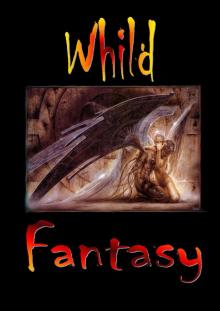 Neq the Sword
Neq the Sword Pandora Park
Pandora Park Juxtaposition
Juxtaposition Bearing an Hourglass
Bearing an Hourglass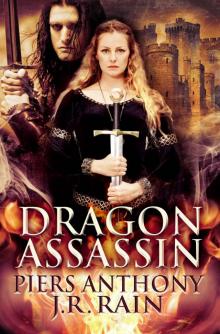 Dragon Assassin
Dragon Assassin Board Stiff
Board Stiff Virtual Mode
Virtual Mode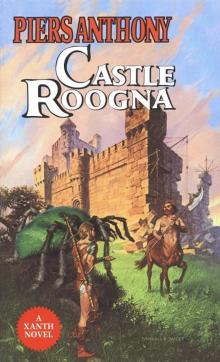 Castle Roogna
Castle Roogna Aliena Too
Aliena Too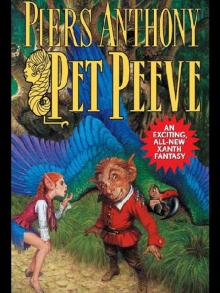 Pet Peeve
Pet Peeve The Metal Maiden Collection
The Metal Maiden Collection Volk
Volk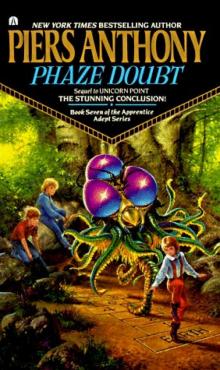 Phaze Doubt
Phaze Doubt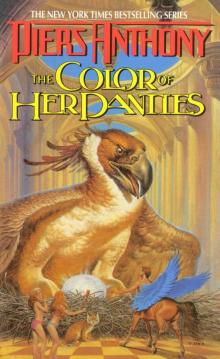 The Color of Her Panties
The Color of Her Panties Amazon Slaughter and Curse of the Ninja Piers Anthony
Amazon Slaughter and Curse of the Ninja Piers Anthony The Worm Returns
The Worm Returns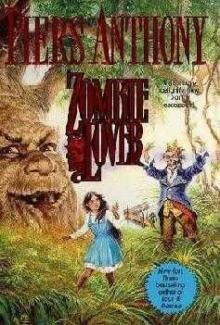 Zombie Lover
Zombie Lover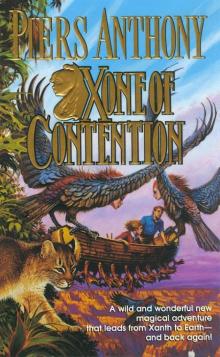 Xone of Contention
Xone of Contention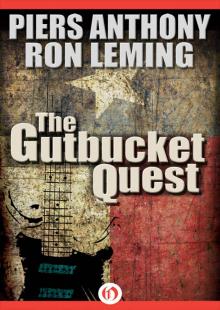 The Gutbucket Quest
The Gutbucket Quest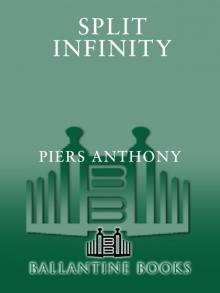 Split Infinity
Split Infinity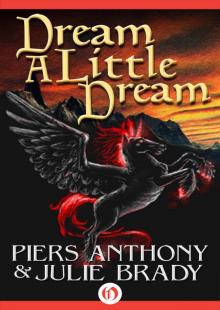 Dream a Little Dream: A Tale of Myth and Moonshine
Dream a Little Dream: A Tale of Myth and Moonshine Balook
Balook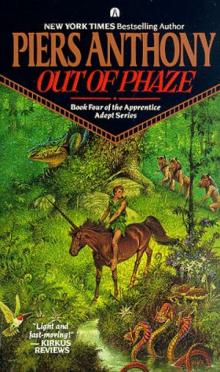 Out of Phaze
Out of Phaze The Secret of Spring
The Secret of Spring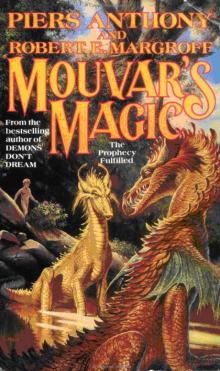 Mouvar's Magic
Mouvar's Magic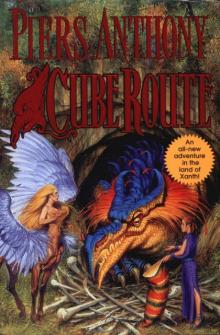 Cube Route
Cube Route Mercenary
Mercenary Total Recall
Total Recall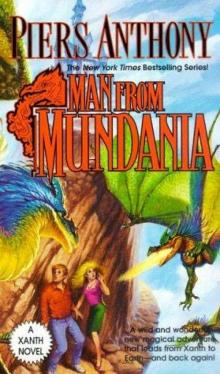 Man From Mundania
Man From Mundania The Magic Fart
The Magic Fart Letters to Jenny
Letters to Jenny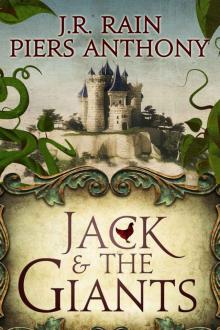 Jack and the Giants
Jack and the Giants Executive
Executive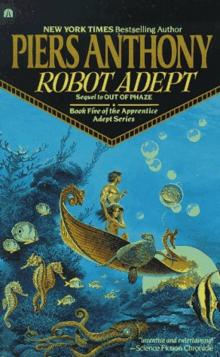 Robot Adept
Robot Adept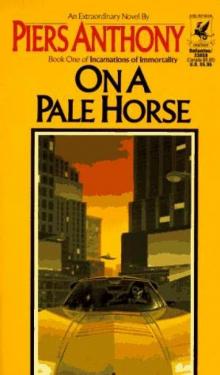 On A Pale Horse
On A Pale Horse Vale of the Vole
Vale of the Vole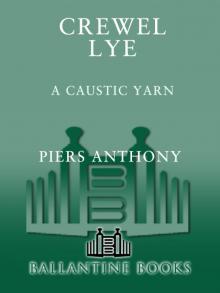 Crewel Lye
Crewel Lye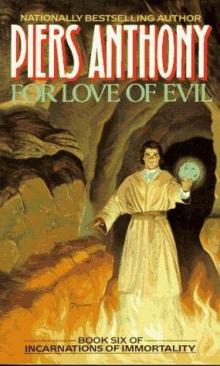 For Love of Evil
For Love of Evil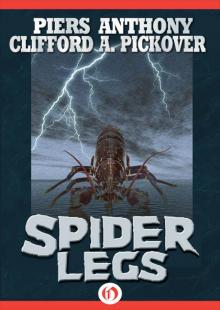 Spider Legs
Spider Legs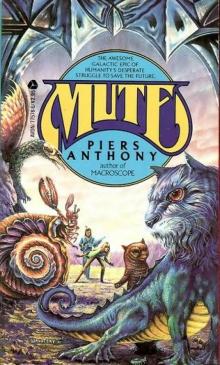 Mute
Mute Being a Green Mother
Being a Green Mother Hair Suite
Hair Suite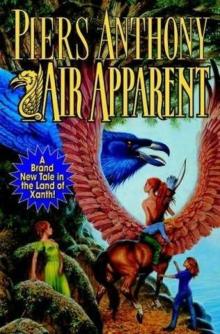 Air Apparent
Air Apparent Politician
Politician Aliena
Aliena Phthor
Phthor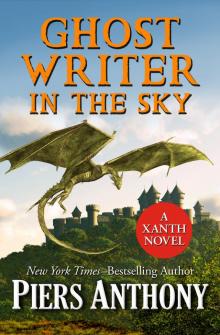 Ghost Writer in the Sky
Ghost Writer in the Sky Pornucopia
Pornucopia Eroma
Eroma Shepherd
Shepherd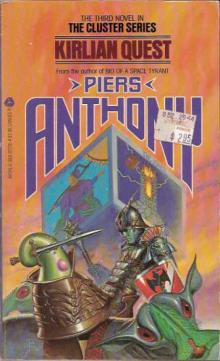 Kirlian Quest
Kirlian Quest Swell Foop
Swell Foop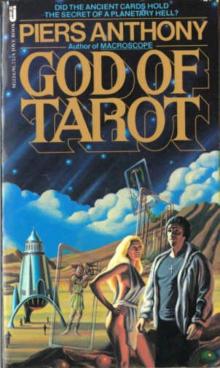 God of Tarot
God of Tarot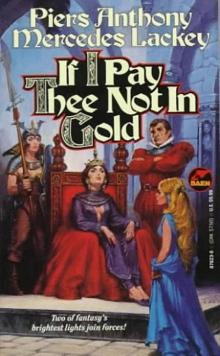 If I Pay Thee Not in Gold
If I Pay Thee Not in Gold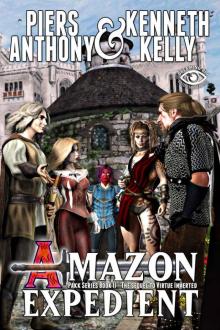 Amazon Expedient
Amazon Expedient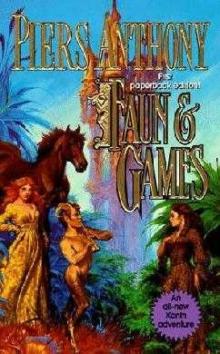 Faun & Games
Faun & Games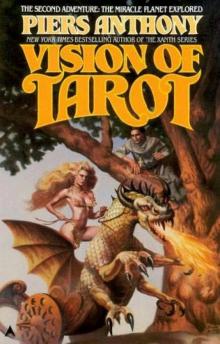 Vision of Tarot
Vision of Tarot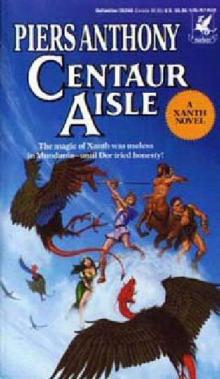 Centaur Aisle
Centaur Aisle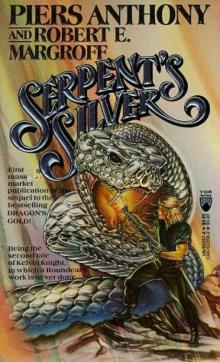 Serpent's Silver
Serpent's Silver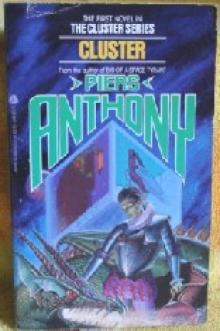 Cluster
Cluster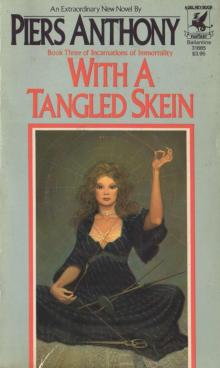 With a Tangled Skein
With a Tangled Skein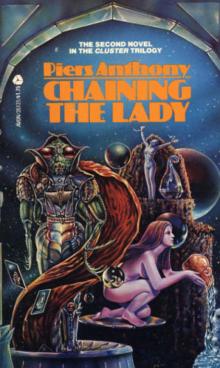 Chaining the Lady
Chaining the Lady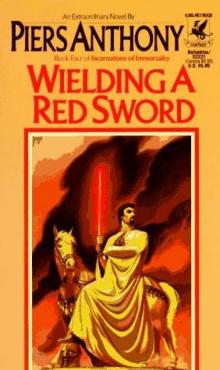 Wielding a Red Sword
Wielding a Red Sword Key to Chroma
Key to Chroma WereWoman
WereWoman Isis Orb
Isis Orb Hair Peace
Hair Peace Two to the Fifth
Two to the Fifth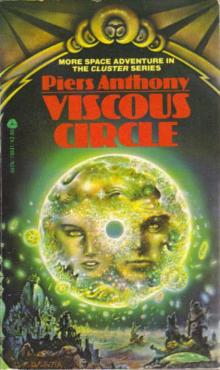 Viscous Circle
Viscous Circle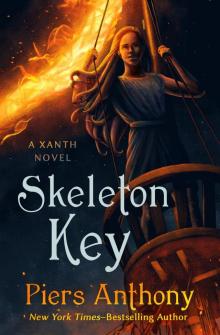 Skeleton Key
Skeleton Key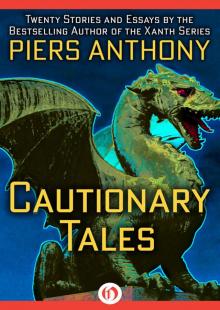 Cautionary Tales
Cautionary Tales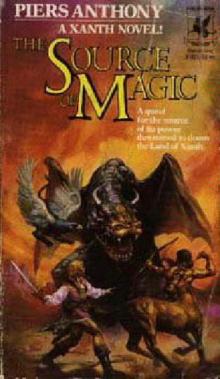 The Source of Magic
The Source of Magic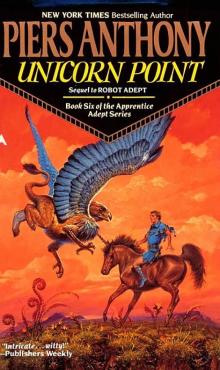 Unicorn Point
Unicorn Point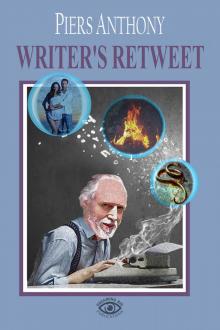 Writer's Retweet
Writer's Retweet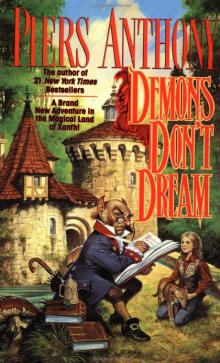 Demons Don't Dream
Demons Don't Dream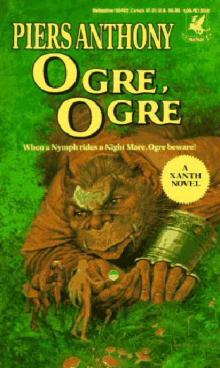 Ogre, Ogre
Ogre, Ogre The Iron Maiden
The Iron Maiden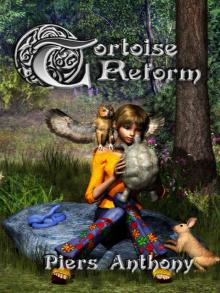 Tortoise Reform
Tortoise Reform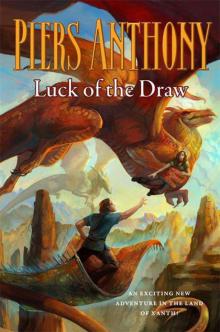 Luck of the Draw
Luck of the Draw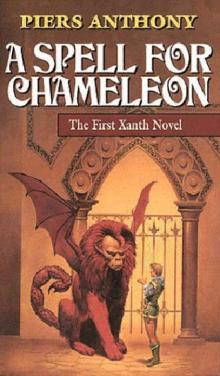 A Spell for Chameleon
A Spell for Chameleon Yon Ill Wind
Yon Ill Wind Currant Events
Currant Events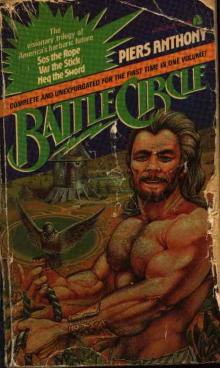 Var the Stick
Var the Stick And Eternity
And Eternity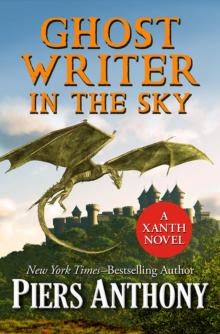 Kiai! & Mistress of Death
Kiai! & Mistress of Death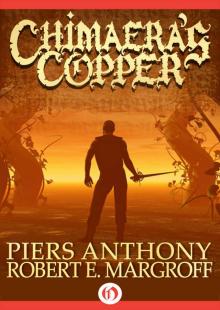 Chimaera's Copper
Chimaera's Copper Refugee
Refugee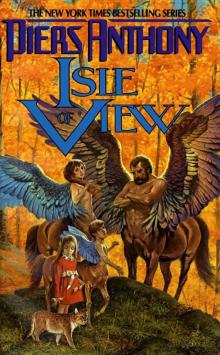 Isle of View
Isle of View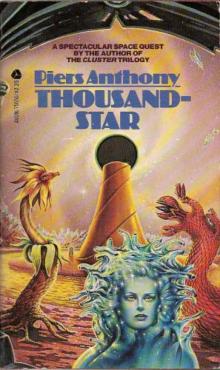 Thousandstar
Thousandstar Mer-Cycle
Mer-Cycle Service Goat
Service Goat Five Portraits
Five Portraits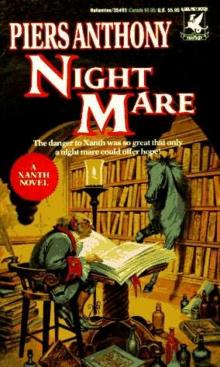 Night Mare
Night Mare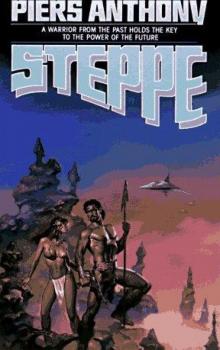 Steppe
Steppe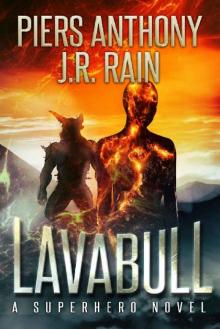 Lavabull
Lavabull Well-Tempered Clavicle
Well-Tempered Clavicle Aladdin Relighted
Aladdin Relighted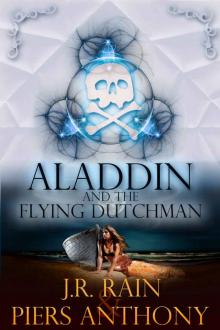 Aladdin and the Flying Dutchman
Aladdin and the Flying Dutchman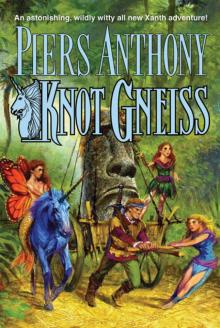 Knot Gneiss
Knot Gneiss Roc and a Hard Place
Roc and a Hard Place Aladdin Sins Bad
Aladdin Sins Bad Flytrap
Flytrap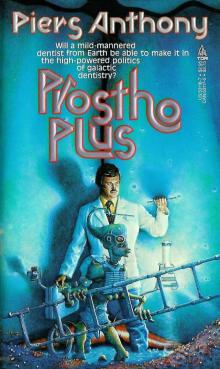 Prostho Plus
Prostho Plus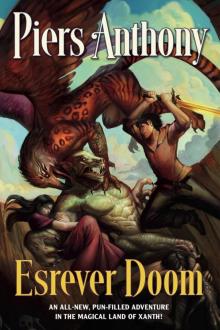 Esrever Doom
Esrever Doom Hair Power
Hair Power The Journey
The Journey Virtue Inverted
Virtue Inverted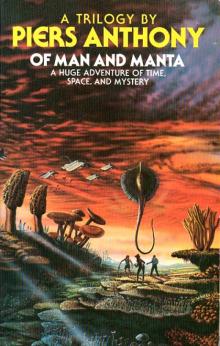 Of Man and Manta Omnibus
Of Man and Manta Omnibus Trail Mix: Amoeba
Trail Mix: Amoeba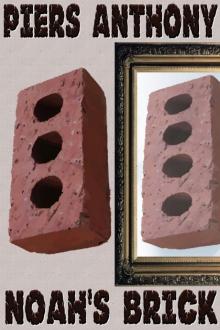 Noah's Brick
Noah's Brick Odd Exam
Odd Exam Magenta Salvation
Magenta Salvation Jest Right
Jest Right Fire Sail
Fire Sail Chthon a-1
Chthon a-1 Amoeba
Amoeba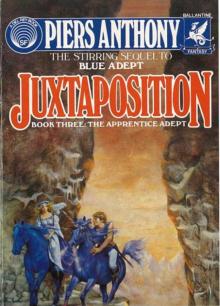 Juxtaposition aa-3
Juxtaposition aa-3 Pira
Pira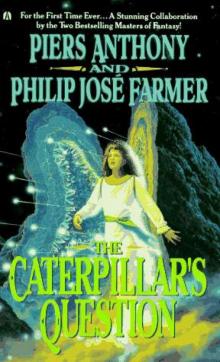 THE CATERPILLARS QUESTION
THE CATERPILLARS QUESTION What Fears Become: An Anthology from The Horror Zine
What Fears Become: An Anthology from The Horror Zine Bio of a Space Tyrant Vol. 3. Politician
Bio of a Space Tyrant Vol. 3. Politician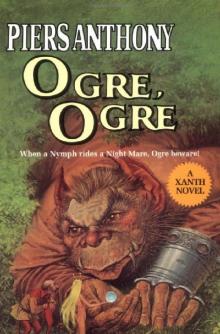 Ogre Ogre x-5
Ogre Ogre x-5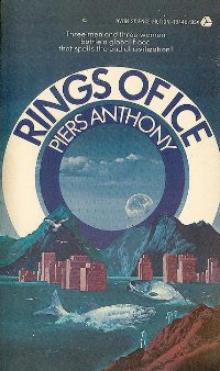 Rings of Ice
Rings of Ice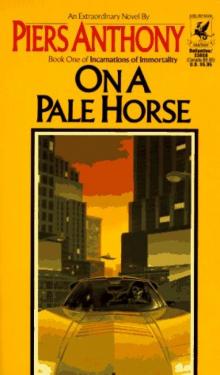 On a Pale Horse ioi-1
On a Pale Horse ioi-1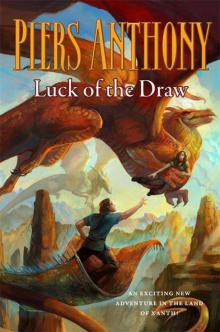 Luck of the Draw (Xanth)
Luck of the Draw (Xanth)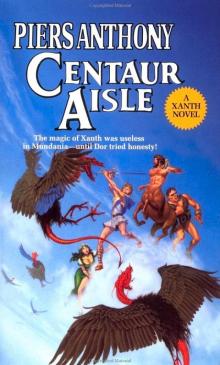 Centaur Aisle x-4
Centaur Aisle x-4 Thousandstar (#4 of the Cluster series)
Thousandstar (#4 of the Cluster series)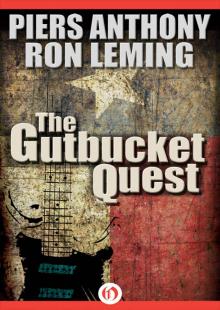 Gutbucket Quest
Gutbucket Quest Isle of Woman (Geodyssey)
Isle of Woman (Geodyssey)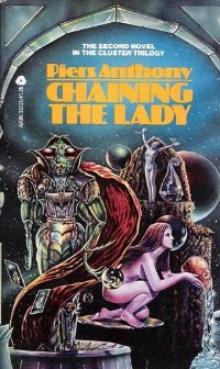 Chaining the Lady c-2
Chaining the Lady c-2 To Be a Woman
To Be a Woman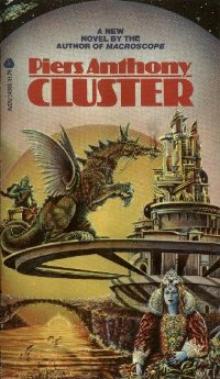 Cluster c-1
Cluster c-1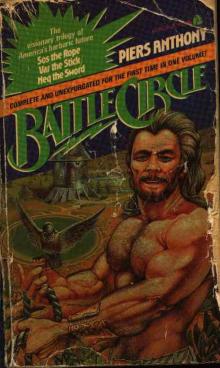 Battle Circle 2 - Var the Stick
Battle Circle 2 - Var the Stick Mercenary (Bio of a Space Tyrant Book 2)
Mercenary (Bio of a Space Tyrant Book 2)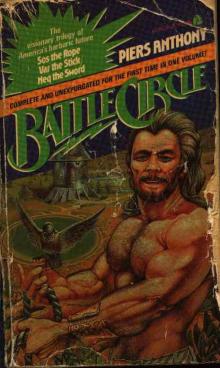 Battle Circle 1 - Sos the Rope
Battle Circle 1 - Sos the Rope Xanth 30 - Stork Naked
Xanth 30 - Stork Naked Secret of Spring
Secret of Spring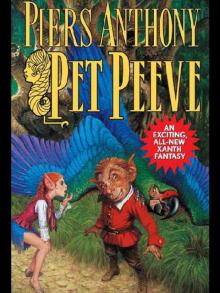 Xanth 29 - Pet Peeve
Xanth 29 - Pet Peeve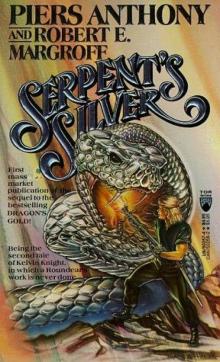 Serpents's Silver
Serpents's Silver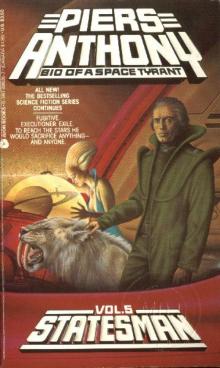 Statesman by Piers Anthony
Statesman by Piers Anthony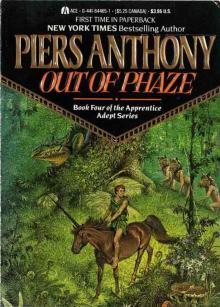 Out of Phaze aa-4
Out of Phaze aa-4 Amazon Slaughter & Curse of the Ninja
Amazon Slaughter & Curse of the Ninja